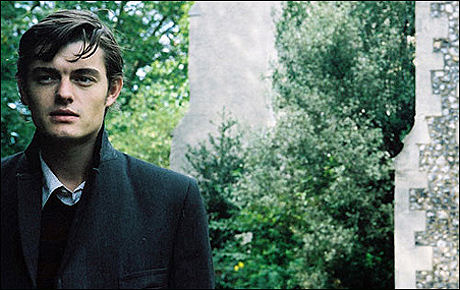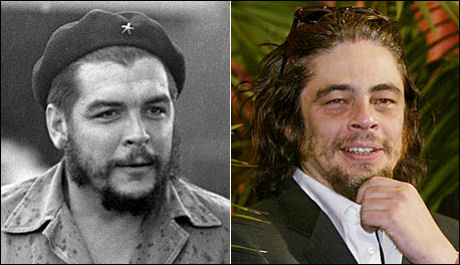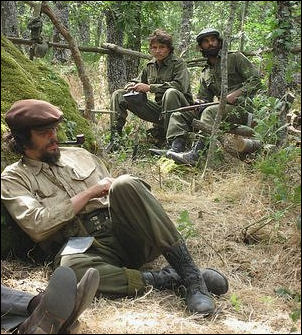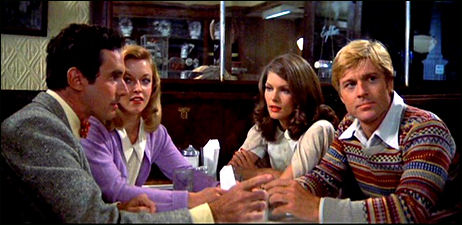Hillary Clinton‘s “Walter Mitty Moment” — an apparent fabrication about the non-dangerous circumstances of a 12 year-old state visit to Tuzla, Bosnia — is reviewed in this 3.22 Daily Kos posting and this Washington Post Fact-Checker report. Very Weird. Busted, in any case…and for what?
Day: March 22, 2008
Lowball
There are two grabbers in Katrina Onstad‘s 3.23 N.Y. Times profile of Stop-Loss director-writer Kimberly Peirce. One is a blunt comment from Peirce about her career, the second is her non-response to a cheap-shot question by Onstad (and a cheap-shot collusion on the part of her editors).

Stop-Loss director-writer Kimberly Peirce, Ryan Phillipe.
The first, following a statement that “after almost a decade in the Hollywood wilderness trying to find a project that would equal her first film, she earned just a single directorial credit, for an episode of the television series The L Word,” is Pierce saying “Yes, I should have made a movie sooner…yes, I should be a lot richer than I am….mea culpa.√ɬ¢√¢‚Äö¬¨√Ǭù
I’m not going to quote from or describe the second thing, but check it out and tell me what you think. I think it’s an icky paragraph.
Just Another Poll
Today’s Gallup tracking poll shows Barack Obama retaking the national lead over Hillary Clinton “after the Jeremiah Wright scandal had badly damaged his numbers and put him behind for nearly a week,” says a 3.22 Talking Points Memo report. Obama is now at 48% (up 3) to Clinton’s 45% (down 2). Obama’s Philadelphia speech last Tuesday combined with Bill Richardson‘s endorsement “have gone a long way in fixing his poll numbers for now, but he still has yet to fully recover the six-point lead he had in Gallup a little over a week ago.”
Richardson’s Reason
Last weekend’s Philadelphia speech is what finally convinced Gov. Bill Richardson to endorse Sen. Barack Obama. He was leaning in this direction, but the speech is what did it.
“The decision by Mr. Richardson, who ended his own presidential campaign on Jan. 10, to support Mr. Obama was a belt of bad news for Sen. Hillary Clinton,” writes N.Y. Times reporter Adam Nagourney and Jeff Zeleny. “It was a stinging rejection of her candidacy by a man who had served in two senior positions in President Bill Clinton‘s administration, and who is one of the nation’s most prominent elected Hispanics.
“Mr. Richardson came back from vacation to announce his endorsement at a moment when Mrs. Clinton’s hopes of winning the Democratic nomination seem to be dimming.
“But potentially more troublesome for Mrs. Clinton was what Mr. Richardson said in announcing his decision. He criticized the tenor of Mrs. Clinton’s campaign. He praised Mr. Obama for the speech he gave in response to the furor over racially incendiary remarks delivered by Mr. Obama’s former pastor, the Rev. Jeremiah A. Wright Jr.
“And he came close to doing what Mrs. Clinton’s advisers have increasingly feared some big-name Democrat would do as the battle for the nomination drags on: Urge Mrs. Clinton to step aside in the interest of party unity.
“‘I’m not going to advise any other candidate when to get in and out of the race,’ Mr. Richardson said after appearing in Portland with Mr. Obama. ‘Senator Clinton has a right to stay in the race, but eventually we don’t want to go into the Democratic convention bloodied. This was another reason for my getting in and endorsing, the need to perhaps send a message that we need unity.”
You Like Costumes?
“WANTED a PA for the costume dept for a upcomming [sic] Oliver Stone movie called W. A car a must & some computer skills also interest in costumes.” — from a 3.12.08 Craig’s List posting. An “interest” in costumes? As in…what, a passing interest? As in some good ole boy in a flannel shirt sitting around with a beer and saying, “Shit yeah, I like costumes”?
More Cannes ’08 Forecastings
A recent Agence Press article predicted that Steven Soderbergh‘s The Argentine, the first of his twin Che Guevara movies with Benicio del Toro in the lead role, would play at the ’08 Cannes Film Festival. That may have been half-wrong. A 3.21 Hollywood Reporter forecast piece by Stephen Zeitchik is reporting that both The Argentine and Guerilla, the second Che pic, will likely show there as a team.

Sam Riley in Gerald McMorrow’s Franklyn
If this is true (and it seems like it might be with two disparate trade publications saying close to the same thing), it’ll be good to be able see and contemplate these films among liberal-minded elite journalists and the leftie European intelligentsia without having to deal with complaints from right-wing blowhards that these films glorify Guevara instead of rightly portraying him as a dogmatic fiend who presided over firing squads, etc. (I know for a fact that October ’06 versions of the two scripts don’t depict Guevara in a glorified light — here‘s my report.)
The tempest will kick in once the films open in the U.S., of course — cue Fox News! — but thank heaven there’ll be at least a brief period of Mediterranean calm beforehand.
Zeitchik is also hearing that the following films may be Cannes ’08 selections: Bertrand Tavernier‘s In the Electric Mist with Tommy Lee Jones; I Come With The Rain with Josh Hartnett; Fernando Meirelles‘ Blindness, Walter Salles‘ Linha de Passe; and Wim Wenders‘ The Palermo Shooting with Dennis Hopper and Milla Jovovich in an Italian-based setting.
Italian and French entries may include Paolo Sorrentino‘s Il Divo, Matteo Garrone‘s Gomorra (about organized crime in Italy); Michel Houellebe‘s La Possibilite d’un Ile, Souad el Bouhati‘s Francaise, Arnaud Desplechin‘s Un conte de Noel with Catherine Deneuve, Francois Dupeyron‘s Aide-toi, le ciel t’aidera, and Bertrand Bonello‘s De la guerre with Asia Argento and Mathieu Amalric.
English titles may include Saul Dibb‘s The Duchess with Keira Knightley, John Maybury’s The Edge of Love, a Dylan Thomas biopic with Matthew Rhys in the title role and costarring Knightley, Sienna Miller and Cillian Murphy; Gerald McMorrow‘s Franklyn with Sam Riley, Ryan Phillippe and Eva Green and possibly Julian Jarrold‘s new adaptation of Brideshead Revisited.
Hey, what about Beeban Kidron‘s Hippie Hippie Shake, about a counter-culture rag published in late ’60s London? Perhaps it won’t be ready until Toronto. I’m detecting a whiff of difficulty on this one.
Reappraising Che Scripts
Given the apparent likelihood of Steven Soderbergh‘s The Argentine and Guerilla playing at the Cannes Film Festival two months hence, here’s a condensed reposting of my impressions of Peter Buchman‘s scripts which I ran over a year ago.

The scripts, both dated 10.4.06, are “awfully damn good — a pair of lean, gritty, you-are-there battle sagas, one about success and the other about failure. Together they comprise a strong and properly ambiguous whole.
“Obviously political and terse and rugged, they’re about how living outside the law and fighting a violent revolution feels and smells and chafes on a verite, chapter-by-chapter basis. They’re about sweat and guns and hunger and toughing it out…friendships, betrayals, exhaustion, shoot-outs and trudging through the jungle with a bad case of asthma. What it was, how it happened…the straight dope and no overt ‘drama.’
“If Soderbergh does right by what’s on the page, The Argentine and Guerilla (which Focus Features will apparent not distribute, I’m told — there’s talk about Warner Bros. stepping in) will have, at the very least, a Traffic-like impact.
“The films will almost certainly be Oscar contenders, and you have to figure that del Toro, playing a complex, conflicted hero who ends up dead (i.e. executed in a rural schoolhouse by a drunken Bolivian soldier), will be up for Best Actor. The Guevara role is too well written (nothing but choice, down- to-it dialogue from start to finish) and del Toro is too talented an actor — it can’t not happen.

“In fact, I can easily imagine critics comparing Soderbergh’s two-part saga to Francis Coppola‘s The Godfather and The Godfather, Part II — not necessarily in terms of quality or emotional-impact issues but because they convey two distinct and disparate sides of Guevara’s saga, the up and the down, in the same way that Coppola’s films are about the youthful ascent and malignant, middle-aged descent of Al Pacino‘s Michael Corleone.
“Another analogy is the first half of Lawrence of Arabia vs. the second half.
“The Argentine is about Fidel Castro and Guevara’s forces leading their small anti-Batista army from their arrival on Cuban shores in 1956 until their victory in late ’58. Guerilla is about Guevara’s failed attempt to spark a subsequent revolution in Bolivia in 1967. The former is about struggle, strength and triumph, and Guerilla is its opposite number — the same fight minus the wind in the sails.”
One Good Scene Saves It
Among Joe Queenan‘s choices of the worst films ever made, he puts Futz (’69), about a man who falls in love with a pig, at the top of the list, followed by La Grande Bouffe, A Walk With Love and Death, Pier Paolo Pasolini‘s Salo, or the 120 Days of Sodom (“as vile as any film I have ever seen”) and Sydney Pollack‘s The Way We Were for being “as treacly and flatulent as any movie I know of.”

I’ve also found portions of Pollack’s 1973 film grating — I want to reach out and strangle Bradford Dillman‘s character every second he’s on-screen, I’ve always hated songwriters Alan and Marilyn Bergman‘s title song, and Marvin Hamlisch‘s score has always strike me as way too stringy and MOR. But Queenan has an arterial blockage if he doesn’t get that the curious spiritual tension between Robert Redford‘s Hubbell and Barbra Streisand‘s Katie is one of the most intriguing undercurrents ever used in a mainstream romance film.
As drippy as their union may seem to Queenan in other ways, it is based upon spiritual emptiness (in Streisand’s character also) and a need to try and fill the void with what the other has. Redford plays a talented but relatively shallow writer whose attraction to Streisand is based upon her possessing the fire and conviction that he lacks, and her belief that he has more depth than he himself believes is there. Perhaps not the most profound idea to ever animate a film of this kind, but it’s dramatized intelligently and with a certain old-school delicacy and poise. This alone means Queenan can’t condemn TWWW as one of the all-time worst. It’s sloppy critical thinking.
And you can’t dismiss a film as a legendary stinker, even by curious personal standards, if it has a single great scene, which The Way We Were clearly does. You can’t say the rapprochement-outside-the-Plaza Hotel scene at the very end doesn’t work. Not when Streisand first meets Redford and his new shiksa wife, but when he comes back the second time, alone, and says, a little sadly, “You never give up, do you?” That is what’s known in movie-lover circles, whether or not you hate Redford or Streisand or Hamlisch or anyone or anything else connected with this film, as “good stuff.”
Which means that The Way Were cannot be dismissed in Queenan-type fashion. One of the most elemental Movie God laws states that any film that has one effective scene must always be afforded at least a measure of respect. Even if 95% of it is awful or mediocre, the presence of one great scene always saves it.
Where It’s Going
The Salt Lake Tribune‘s Sean P. Means continues the lament about dead-tree film critics being shown the door by major newspapers and syndicates. “It seems like every week we in the news business hear about another paper cutting staff,” he writes, [“and] every time it happens, it seems, at least one of the jobs cut is the movie critic’s.”
Besides the obvious economic reasons, a key reason for this, as I said to the Hollywood Reporter‘s Gregg Goldstein a few days ago, is that today’s moviegoers are far less interested in meekly accepting the word of the lofty know-it-alls. It’s all about the conversation, the community talk-back. And like I said, there’s a small group of online critics who genuinely matter and are, in the parlance of the trade, ‘conversation starters.’
This is where it’s at, where it’s all going. Obviously not among the moviegoers of Hillary Clinton‘s and John McCain‘s generation, but among the GenX Barack Obama crowd and younger.
Binoche on Minghella
Juliette Binoche has written a little poem about the departed Anthony Minghella, who directed her in The English Patient. She sent it to Entertainment Weekly, whose editors posted it three days ago.
Saturday numbers
Fox’s Dr. Seuss’ Horton Hears a Who! is the weekend’s #1 film with studio counters estimating earnings of $26.3 million by Sunday night. Tyler Perry’s Meet the Browns will run second with $22.5 million. Shutter, the horror film that didn’t screen for critics, is third with $11.5 million. Drillbit Taylor will come in fourth with a weekend tally of $10.1 million….off to the showers. Amazingly, the utterly dismissable 10,000 B.C. (people are actually still saying to each other, “Hey, let’s go see this!”) will come in fifth with $9.2 million.
Never Back Down will come in sixth with $5.3 million, followed by College Road Trip with $4.8 million. The eighth-ranked The Bank Job, slow but steady, will make about $4.2 million with a Sunday night cume of $19.5 million. Vantage Point, $3.7 million. Doomsday, $2.2 million. Under The Same Sun, in a limited 300-theatre run, will do about $2.1 million at $7000 a print.
Eulogy
This is a non-movie story, and if that’s not to your liking, tough. A Catholic service is being held for my recently deceased sister Laura on Tuesday, 3.15, in Southport, Connecticut. I can’t be there so I decided to write a little remembrance, which somebody will hopefully read to the congregation. I tapped it out this morning:

When she was young, before her mid-teen years, my sister Laura was very much in the game. She had a high IQ — higher than mine, I recently learned — and was quick and alert. She told and got jokes, and was animated, energetic, playful and full of pep. She had a wonderful laugh and had, until the end of her life, the most beautiful smile I’ve ever seen.
As a young girl she was sometimes feisty and scrappy. One of my vivid early memories is coming home from elementary school one afternoon (I was in the first or second grade) and telling my mother, who was lying on her bed, about something good that had happened — a good grade, a pat on the back from my teacher, something along these lines — and Laura, who was standing next to my mother’s bed, saying, “So what?”
My mother rebuked her, angrily, but what Laura said was the mark of a sharp, spunky, intelligent and competitive person. She’d listened to my classroom story and decided it was unexciting or unremarkable or inane, and, consistent with the nature of all young siblings who want to put their sisters or brothers in their place, instantly voiced a disapproving judgment.
I was never as close to Laura, then or later in life, as was Tony, our younger brother, but I’ve never forgotten this impression of her — a girl who had opinions and gumption and intelligent judgment to spare, and who gave as good as she got.
Sadly, that side of Laura never matured, much less developed. She became afflicted in her mid-teen years with schizophrenia and never left the ground, much less spread her wings. Most of her life, sadly, was about coping, about holding on as best she could and getting by with a measure of dignity. She lived in her heart and her mind, but not, truth be told, very much in the present.
A few days ago I heard a writer or journalist of some distinction (I forget his name) say that Ireland wasn’t about the present or the future, but about the past, over and over. As she got older, that was Laura through and through.
She was occasionally a scrappy, sometimes contentious person, but she was mostly quiet and gentle and meditative. She had a good heart, which is to say a better heart than mine. She cared deeply about spiritual matters, and one aspect of this is that she became a Catholic, as I recall, sometime near the start of this century.
Her day-to-day life was about what she could do within the margins of her affliction, a cruel hand that was dealt to her at birth, but her inner life was sometimes enormous and deep and radiant.
Laura and I shared a trip to Europe in the early summer of ’03. I picked her up at Nice Airport during the closing days of the Cannes Film Festival. The next day Laura came to a screening with me of Clint Eastwood‘s Mystic River, which showed at the Grand Palais. The next day we rented a car and drove east and southeast into Italy, and then to a small town in Tuscany called San Donato. The proprietor of the b & b where Laura and I stayed for two or three nights is a woman named Elisa Prati, who chatted with Laura a lot and loved her company. In the years since (I’ve written Elisa often and stayed there last year with my son, Jett), she has asked me how Laura is, and has said more than once what a beautiful person she is.
During our stay in San Donato Laura and I went to an outdoor backyard dinner — about 8 in the evening — at the home of an Italian chef named Matthias Pommer. There were six or seven of us, and candles on the table and the sound of crickets and a wonderful earthy aroma from the nearby vineyards. That moment was probably the most peaceful and settled and serene of our entire Italian visit.
For the truth is that Laura, despite the wonder of our being in Italy and experiencing all these new sights and flavors and absorbing all that culture and history, spent about a quarter of her time there — our time in the car mostly — going over her problems and unresolved feelings about her life, mostly about things that had been hurtful or gone wrong for her in her teens and 20s.
The second best moment — or perhaps the best moment of all — happened in Rome, when Laura was sitting behind me on a dark blue scooter as we drove all through the city, sometimes getting lost but eventually finding our way, zooming around the Collisseum and through the Villa Borghese and all the campos and piazzas. As we started out I remember speeding along the main throroughfare that ran along the Tiber river, and hearing Laura going “woo!” as we went under a bridge.
We stayed on that road for two or three miles, and then we turned left on a bridge and crossed over the Tiber and turned left again to head back to the center of the city. And all of a sudden we saw Vatican City on our right and Laura said, “Jeff, Jeff…the Vatican! There’s St. Peter’s!” I pulled over and we decided then and there that Laura would visit the Vatican and the Sistine Chapel on her own and that I would return to pick her up at this very spot, three hours later. And she took off on foot and I pulled back into traffic.
As I rode along I smiled about the reemergence of the old Laura. A sharp, spunky, intelligent woman who’d seen the Vatican out of the corner of her eye and decided right then and there. A woman of gumption, vision and intelligence who knew what she wanted, made a quick judgment for the better, and who gave back to Rome as good as she got.
